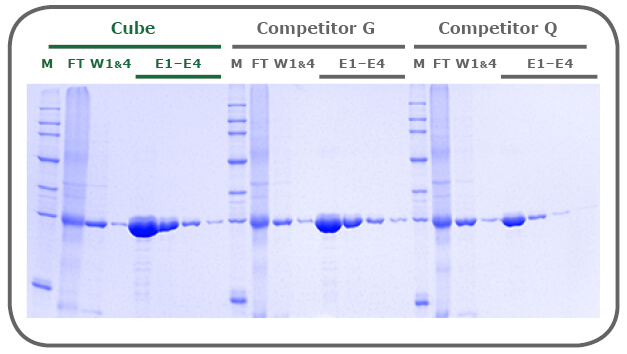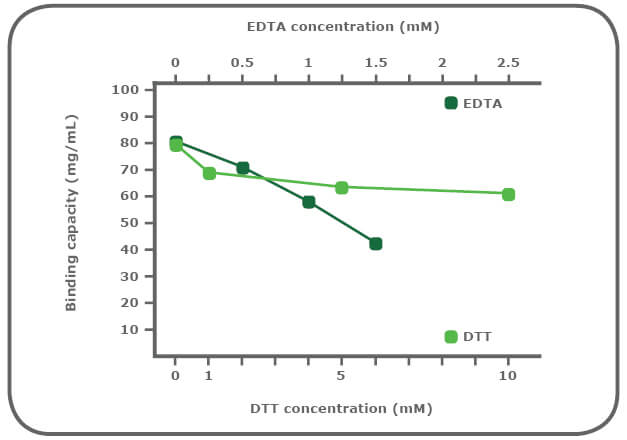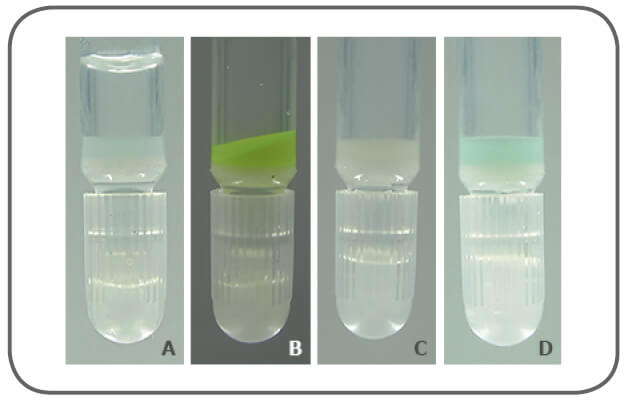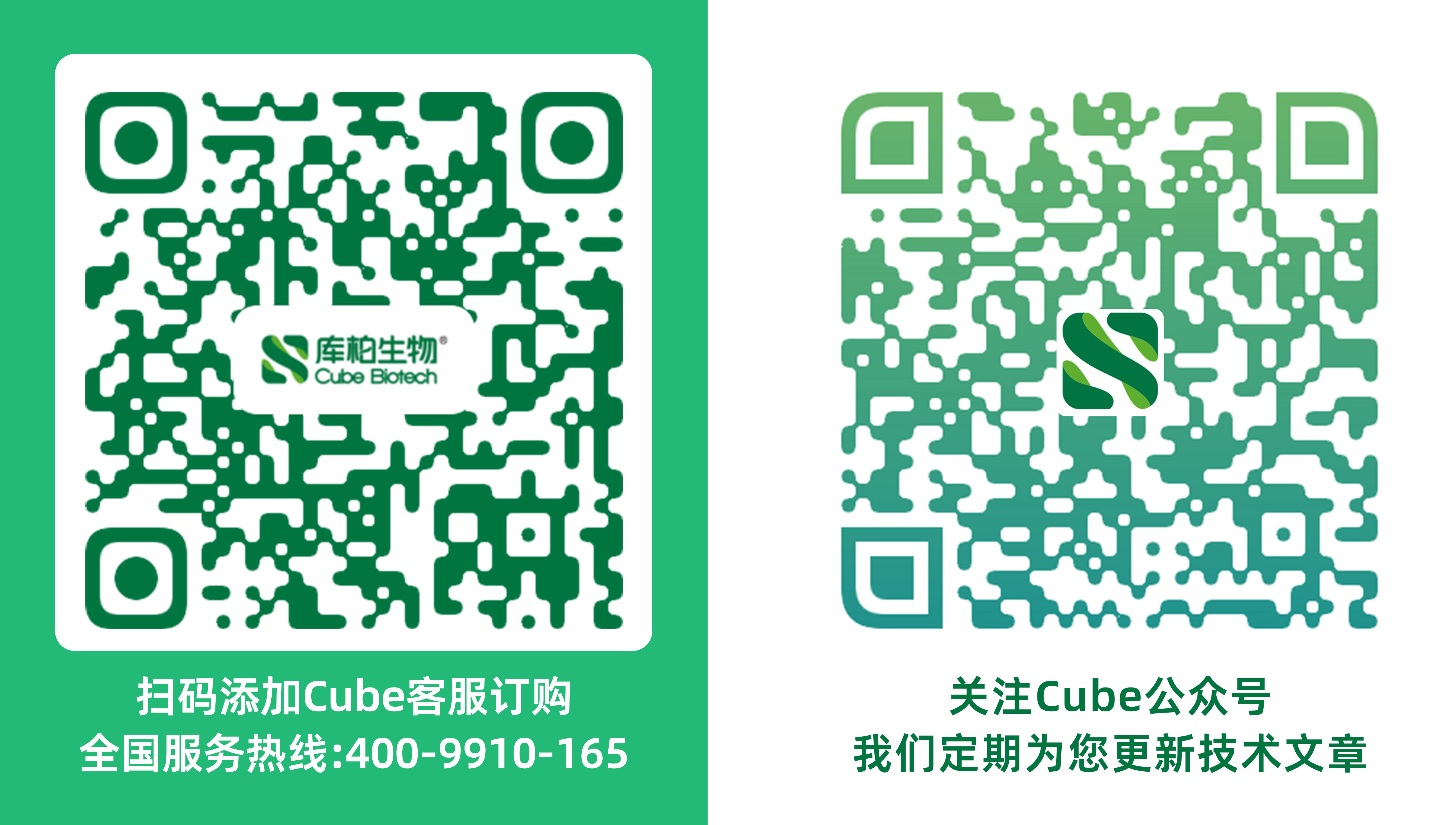PureCube 100 Compact Cartridge Ni-NTA
The term Ni-NTA (Nickel NTA) refers to a nickel2+ ion that has been coupled to Nitrilotriacetic acid (NTA). Ni-NTA can then be coupled to agarose resin or magnetic beads for IMAC (Immobilized Metal Chelate Affinity Chromatography). This is a purification method to obtain functional His-tagged protein. The size of the used agarose resin beads or magnetic beads influences the flow rates and the protein yield. We offer our 100 PureCube Ni-NTA Aaarose resin pre-filled in COMPACT Columns / Cartridges for FPLC based His Tag purification. The COMPACT columns / cartridges are compatible with many FPLC machines like ÄKTA. Compare your hardware with the features listed on the corresponding table to see if the COMPACT cartridges are matching your setup. In case columns with different measurements are needed we offer these cartridges / columns filled with PureCube 100 Ni-NTA resin. Alternatively we offer our same COMPACT cartridges filled with smaller Ni-NTA beads (40 µm) if protein yield is of more importance than flow rates.
1.Affinity Resin
PureCube 100 Ni-NTA Agarose was developed for the affinity purification of proteins carrying a polyhistidine tag. This affinity chromatography matrix is based on a highly cross-linked, 6% agarose. The material is highly porous to allow for optimal protein interaction. PureCube 100 Agarose is also physically very stable, making it suitable for purification processes under low pressure with variable flow rates. The diameter of the beads is 50-150 µm, providing excellent flow behavior and a high degree of reproducibility between individual purification runs.
An NTA ligand is coupled to the agarose resin and carefully loaded with nickel ions to obtain a matrix with highest binding capacity for histidine residues. The metal ion capacity is about 15 µeqv Ni2+/mL. Other possible metal ions are Co2+, Zn2+, Fe3+, Al3+, resulting in different affinities, e.g., for zinc-finger proteins or phosphorylated proteins. If required, the nickel ions can be removed from the agarose matrix using five wash steps with 100 mM EDTA, and the matrix can be recharged with a different metal ion. Alternatively, please contact us for unloaded NTA agarose. NTA matrices charged with other metals are available upon request.
2.Protein Binding Capacity
PureCube 100 Compact Cartridges Ni-NTA have a binding capacity of up to 80 mg/mL as determined by purification of 6xHis-tagged GFP protein from E.coli cleared lysates, and quantified via spectrophotometry. It should be considered that the dynamic binding capacity strongly correlates with flow rate and other parameters such as protein size and buffer conditions. It is recommended to use the lowest flow rate possible to achieve highest binding capacity.
3.Compatibility
For cleaning purposes, PureCube 100 Ni-NTA Agarose is very stable and can resist the following conditions in most situations: All commonly used aqueous buffers, pH 2-14, 100% methanol, 100% ethanol, 8 M urea, 6 M guanidinium hydrochloride, 30% (v/v) acetonitrile, and up to 10 mM DTT.
4. High yield and purity
Our unique production process yields a Ni-NTA Agarose that exhibits a protein binding capacity >20% higher than that of two leading competitor products. Figure 1 shows the SDS-PAGE of GFP expressed in E. coli and purified in gravity colums with PureCube Ni-NTA Agarose and the Ni-NTA resin from Competitor G and Competitor Q. The protein yield in 4 elutions (E1-E4, Cube) was 80 mg/mL, compared to 65 and 48 mg/mL obtained with the alternative resins (E1-E4, Competitor G, Competitor Q). Similar results (10-18% higher binding capacity; data not shown here) were obtained comparing the purification of JNK1 (Kinase, 48 kDa) on PureCube Ni-NTA and the Ni-NTA of leading providers.

![]()
![]()
![]()
![]()
Fig. 1: Over 20% more yield obtained with PureCube Ni-NTA Agarose. SDS-PAGE of GFP expressed in E. coli and purified in gravity columns with PureCube Ni-NTA Agarose and Ni-NTA resin from Competitor Q. 80 mg/mL protein yield was obtained with PureCube Ni-NTA Agarose (E1–E4, Cube) compared to 65 and 48 mg/mL, respectively, with the widely used alternative resins G and Q (E1–E4, Competitor G / Competitor Q).
5.Superior DTT and EDTA stability
PureCube Ni-NTA Agarose is very robust in the presence of DTT and EDTA. In a stability test, PureCube Ni-NTA Agarose was exposed to increasing concentrations of DTT or EDTA for 1 h. Thereafter, the resins were used to purify E. coli-expressed GFP-His in gravity columns. The binding capacity of the resin decreased in the presence of both DTT and EDTA but the decay rate was shallow. In presence of DTT, PureCube Ni-NTA Agarose lost on average 8% binding capacity with each increase in DTT concentration, resulting in an overall decay of 22% at 10 mM. Even at 1.5 mM EDTA, the resin still exihibits 54% of its maximum binding capacity (Fig. 2).
![]()

Fig. 2: NTA is robust in the presence of reducing and chelating agents. GFP-His was purified on gravity columns containing PureCube Ni-NTA Agarose after exposing the resin for 1 h to 3 concentrations of DTT or EDTA. NTA exhibits a shallow decay rate in binding capacity.
6.Robust against oxidation and regenerable
PureCube Ni-NTA Agarose retains its color and function after exposure to as much as 10 mM DTT. Figure 3 shows a photo series of the resin after a 1 h exposure to 5 mM DTT. Unlike other resins, PureCube Ni-NTA Agarose did not turn brown (A). The resin was still able to bind GFP (B), with a measured binding capacity of 65 mg/mL (see Fig. 2). The resin could then be regenerated by stripping the NTA, turning the resin white (C), and reloading it with nickel ions (D). The protocol for regenerating PureCube Ni-NTA Agarose can be downloaded.

Fig. 3: PureCube Ni-NTA Agarose is robust against oxidation and regenerable. PureCube Ni-NTA Agarose was exposed to 5mM DTT for 1 h (A). After demonstrating that it could still bind GFP (B), the resin was washed, stripped (C), and reloaded with Ni2+ (D) following standard Cube protocol (see Cube Protocols & Datasheets).
Features - Regarding Purification capabilities.
Type | Cartridge |
Ligand: | NTA |
Coupled Ion: | Ni2+ |
Usage | Specific binding and purification of 6x his-tagged proteins |
Specifity | Affinity to His-tagged proteins |
Binding capacity | >80 mg/mL |
Bead Ligand | Ni-NTA |
Bead size | 100 μm(Agarose) |
Matrix | 6% highly cross-linked agarose |
Chelator stability | Stable in buffer containing 10 mM DTT and 1 mM EDTA |
ph Stability | 2-14 |
Features - Regarding Cartridge / Column itself.
Feature | PureCube Compact Cartridge 1 mL | PureCube Compact Cartridge 5 mL |
Bed Volume | 1 mL | 5 mL |
Dimensions: diameter X length (mm) | 8.0 X 35 | 17 X 35 |
Body material | Polypropylene | |
End Plug Material | Polypropylene | |
Inlet | 10-32 UNF female thread | |
Outlet | 10-32 UNF female thread | |
Max. Flow Rate | 6 mL/min | |
货号 | 产品 | 粒径 (μm) | 每柱 载量 | 运输 温度 | 储存 温度 | 应用 |
74302 | PureCube 100 Compact Cartridge Ni-NTA(1x1ml) | 100 | 80mg | 室温 | 4° C | 预装的PureCube 100 Ni NTA Agarose 填料,pH稳定工作范 围为3—13,在10mM DTT,1mM EDTA,1M NaOH 环境保持稳定,在7mL/min 的流速下,蛋白动态结合能力大于 20mg/mL |
74304 | PureCube 100 Compact Cartridge Ni-NTA (5x1ml) | 100 | 80mg | 室温 | 4° C | |
74306 | PureCube 100 Compact Cartridge Ni-NTA (1x5ml) | 100 | 400mg | 室温 | 4° C | |
74308 | PureCube 100 Compact Cartridge Ni-NTA (5x5ml) | 100 | 400mg | 室温 | 4° C |
如需咨询或订购 中国独家总代理: 成都正民德思生物科技有限公司 www.zenmindes.com
请拨打 400-9910-165 / 028-85568133
或添加微信 zenmindes-sale
 咨询
咨询












 首页
首页
